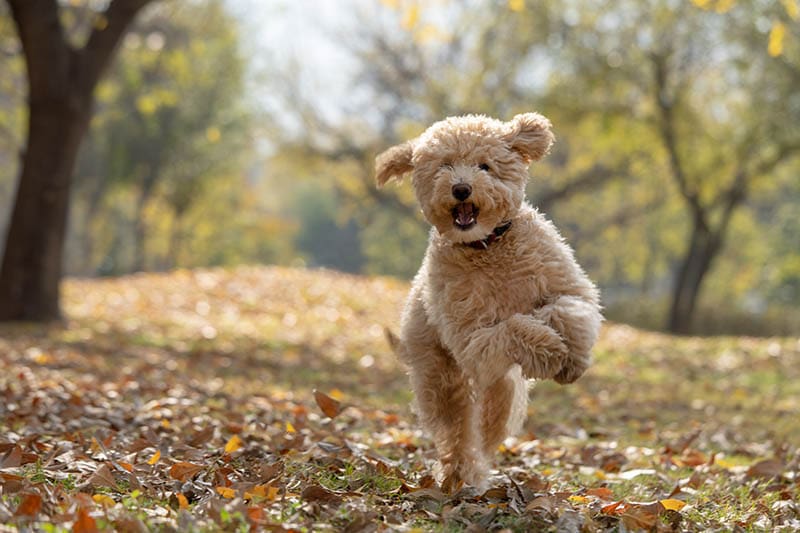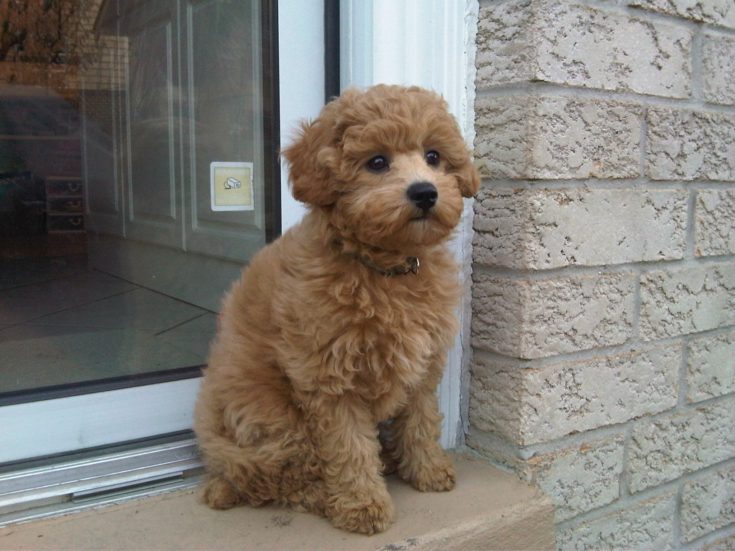How Long Do Mini Goldendoodles Live? Average Lifespan, Data & Care

Updated on

Click to Skip Ahead
Mini Goldendoodles have become a popular breed for their playful and loving temperament. But if you’re thinking about getting one of these dogs as a pet, how long can you expect a Mini Goldendoodle to live? The average lifespan of a Mini Goldendoodle is 12-15 years. In this article, we’ll discuss the average lifespan of Mini Goldendoodles in detail and the factors that can impact their lifespan.
What’s the Average Lifespan of a Mini Goldendoodle?
The average lifespan of a Mini Goldendoodle is 12-15 years, with some living up to 18 years. However, this lifespan can vary depending on various factors, which we will discuss below.

Why Do Some Mini Goldendoodles Live Longer Than Others?
Several factors can impact the lifespan of Mini Goldendoodles:
1. Nutrition
A healthy diet is essential for a Mini Goldendoodle’s lifespan. A nutritionally complete diet is also the best way Goldendoodle owners can contribute to their pet’s overall health. Feeding them a balanced canine diet with quality ingredients will improve their overall health and therefore, help them live longer than dogs that aren’t fed properly.
It is important to note that a dog’s nutritional requirements change throughout their life (depending on their life stage). It’s best to consult with your veterinarian to ensure your dog’s diet is both appropriate and sufficient.
2. Environment and Conditions
A safe and comfortable environment is necessary for your Mini Goldendoodle’s health.. Limiting exposure to harsh weather conditions, providing a clean living space, and offering exercise and mental stimulation opportunities contributes towards your pup’s health. Reducing stress and ensuring a consistent routine can positively affect their health and longevity.

3. Breeding History
A Mini Goldendoodle’s breeding history can also impact their lifespan. If the dog’s parents have a history of health problems or come from a line with a shorter lifespan, it can increase the risk of the dog developing health problems and having a shorter life.
Genetics can significantly affect a Mini Goldendoodle’s lifespan. Puppies that inherit health problems from their parents, such as birth defects or heart issues, can have a shorter lifespan. Responsible breeding practices can help minimize the risk of passing on genetic health issues.
4. Healthcare
Regular vet checkups and preventative care can significantly impact a Mini Goldendoodle’s lifespan. Dogs that receive regular healthcare, including vaccinations, parasite prevention, dental care, and prompt treatment for any health issues, are more likely to live longer than dogs that don’t receive proper care. Additionally, spaying or neutering can contribute to a longer, healthier life by reducing the risk of certain health problems.

The 5 Life Stages of a Mini Goldendoodle
1. Puppy (Pre-Weaned)
This stage lasts from birth until the puppy leaves their mom’s care (at about 6-8 weeks). For the first few weeks of life, Mini Goldendoodle puppies are completely helpless and dependent on their mother for warmth, nourishment, and protection. They are also born with both their eyes and ears closed and cannot hear or see properly. Their primary focus is feeding, sleeping, and growing.
Though they rapidly grow, and gain confidence and strength in the first month of life, they aren’t ready to be weaned until they are about 6-8 weeks old.
2. Juvenile
This stage lasts from weaning till about 6-7 months of age. During this time, Mini Goldendoodle puppies begin to explore their environment and develop their senses. Puppies become more independent and playful during this stage, and are typically adopted at this age. This age is ideal for training your puppy and instilling good habits that will help them throughout their life. In addition, dietary adjustments are usually made at this age too. While newly weaned puppies are usually fed slurry, they can slowly be adjusted to a solid diet at this life stage.
Vaccinations are absolutely crucial at this life stage, as puppies lose the protection their mother’s antibodies offer them during puppyhood. This life stage lasts till about 6-7 months, when puppies get their “adult” teeth.
3. Young Adult
This stage lasts from 7 months to a year old. In this phase, Mini Goldendoodles continue to grow and develop physically, mentally, and socially. They become more energetic and curious, often testing boundaries and exploring new environments. This is an important time for continued socialization, obedience training, and exposure to various stimuli to ensure well-rounded development. Regular exercise and mental stimulation are crucial during this stage to avoid behavioral issues.

4. Mature Adult
This stage starts at a year old and lasts until the Mini Goldendoodle is 10 years old. The Mini Goldendoodle reaches their full physical and mental maturity during this period. They will have established their personality and behavior patterns. This is the prime of their life, and they are generally healthy, active, and well-adjusted. Maintaining a consistent routine with regular exercise, mental stimulation, routine veterinary visits, and a balanced diet is essential to keep your Mini Goldendoodle healthy and happy.
5. Senior
The senior stage starts at 11 years old and continues until the end of the Mini Goldendoodle’s life. In this stage, Mini Goldendoodles may begin to slow down and show signs of aging. They may experience lower energy levels, decreased mobility, and may develop some health issues that accompany old age. This is a crucial time for more frequent (bi-annual) veterinary check-ups to monitor for any age-related health issues. Adjusting their diet and exercise routine and providing extra support for joint health can help ensure your senior mini goldendoodle remains comfortable and content during their golden years.
How to Tell Your Mini Goldendoodle’s Age
There are several ways to tell your Mini Goldendoodle’s age, including:
- Teeth –A dog’s teeth’s number, size, and appearance can help determine their age. This is the most reliable way to age a dog, and can be performed by your veterinarian.
- Sexual Maturity –Mini Goldendoodles reach sexual maturity at around 7-8 months of age. If your puppy isn’t sexually mature, they’re younger than this age.
- Coat –Changes in the appearance of a dog’s coat can indicate their age, such as graying or thinning. However, this is a poor indication of age and is anecdotal at best.
Your vet can examine your Mini Goldendoodle and give you an estimation of how old they are if you’re unsure.
Conclusion
Mini Goldendoodles can live a long and happy life with proper care and attention. Understanding the factors that impact their lifespan, including nutrition, environment and living conditions, breeding history, and healthcare, can help them reach their maximum potential lifespan. By knowing the life stages of a Mini Goldendoodle and working closely with a veterinarian, pet owners can provide the best care for their furry friends and ensure they live their best lives.
Featured Image Credit: SoySendra, Shutterstock












